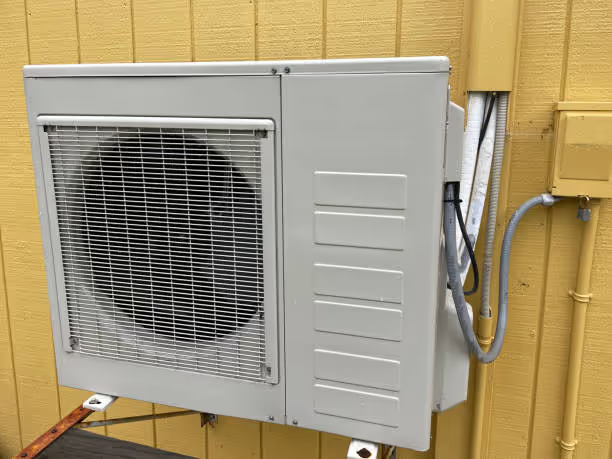Mini Split Repair in Babylon, NY
Mini split systems are a common and efficient choice for Babylon, NY homes and small businesses, providing zoned heating and cooling without ductwork. When a ductless system stops performing, the result is uncomfortable rooms, higher energy bills, and potential secondary damage like mold from condensation. This page explains common mini split problems in Babylon, the diagnostic and repair process, parts and warranty handling, emergency response expectations, pricing factors to expect, and practical preventive maintenance to keep your system reliable year round.

Common mini split issues in Babylon, NY
Mini splits face a mix of seasonal stresses on Long Island: hot, humid summers and cold, salty coastal air in winter can accelerate wear. Frequent service calls commonly diagnose:
- No cooling or heating - unit powers on but fails to reach setpoint; can be caused by low refrigerant, compressor faults, or control problems.
- Reduced airflow or weak output - blocked filters, blower motor issues, or indoor coil restrictions.
- Refrigerant leaks - oily residue on lines or diminishing performance; coastal corrosion can increase leak risk.
- Compressor failures or inverter issues - intermittent operation, high amp draw, or total outdoor unit lockout.
- Frozen indoor coils - caused by low refrigerant, poor airflow, or blocked condensate drains.
- Electrical and control faults - tripped breakers, bad capacitors, failed PCBs, or communication errors between indoor and outdoor units.
- Unusual noises or vibrations - failing fans, loose mounts, or compressor knocking.
- Drainage problems and condensate backups - clogged drain lines or failed condensate pumps causing water leaks and staining.
- Outdoor unit corrosion - salt air near Babylon’s coastline can corrode fins, connections, and line set fittings.
Typical diagnostic process for mini split repair
A consistent, step-by-step diagnostic process ensures accurate fixes and avoids repeat service visits:
- Initial symptom interview - collect runtime history, when problem began, and any recent power events.
- Visual inspection - check indoor and outdoor units for damage, debris, and corrosion.
- Electrical checks - verify power, breakers, line voltage, capacitors, and contactor function.
- Airflow and thermal measurements - measure supply and return temps and record temperature split across the coil.
- Refrigerant system evaluation - check pressures, look for oil residue, and perform leak detection if needed.
- Control and sensor testing - verify thermostats, remote controls, and control board communication.
- Functional test run - run system through modes to recreate symptoms and confirm root cause.
- Written diagnosis and estimate - present findings and recommended repair scope, including parts and expected timeline.
Diagnostic visits in Babylon typically require 45 to 90 minutes depending on system complexity and access.
On-site repair procedures
On-site repairs are performed to current manufacturer and safety standards:
- Cleaning and basic service - filter replacement, indoor coil cleaning, and condensate line clearing.
- Electrical repairs - replacing capacitors, relays, fuses, or repairing wiring connections.
- Refrigerant work - locating and repairing leaks, evacuating, and recharging to manufacturer charge. All refrigerant handling follows required regulations.
- Mechanical replacements - fan motors, expansion valves, reversing valves, or indoor blower assemblies.
- Compressor and outdoor module work - minor compressor repairs or recommending replacement for failed compressors when repair is not viable.
- System balancing and verification - confirming correct airflow, refrigerant charge, and stable operation after repair.
Technicians working in Babylon will account for local conditions like salt corrosion and humidity when choosing repair methods and protective details.
Parts replacement and warranty handling
Common replacement parts include compressors, inverter/PCB boards, fan motors, expansion devices, capacitors, and thermostatic sensors. Warranty handling typically involves:
- Checking manufacturer parts warranty and validating serial numbers and installation history.
- Documenting labor coverage and any service or labor warranty separately.
- Advising when a part is discontinued and discussing suitable OEM or approved aftermarket alternatives.
- Providing service documentation required for warranty claims and future coverage.
Older or out-of-warranty systems may require longer lead times for parts or consideration of system replacement versus costly component repair.
Emergency response and turnaround expectations
Babylon’s weather extremes make prompt response important. Emergency response options vary by season and technician availability:
- Same-day diagnosis is possible for many issues during off-peak seasons; summer peak can extend scheduling to next available slot.
- On-the-spot repairs are completed when common replacement parts are stocked; larger components often require ordering and can extend repair timelines from a few days to a week or more.
- For systems that provide primary heating, priority protocols are followed during cold spells to reduce risk to occupants.
Expect clear communication about arrival windows, parts lead times, and temporary measures to keep spaces safe until full repair is done.
Pricing guidelines and factors that influence cost
Costs vary based on complexity rather than a fixed price point. Key factors that influence repair estimates:
- Age and brand of the mini split and whether parts remain available.
- Type of failure - simple filter/coil service versus compressor replacement or major electronic board swaps.
- Accessibility of indoor units and outdoor condenser, and whether units are wall-mounted or require special access equipment.
- Amount and type of refrigerant required, and whether leak repair is needed before recharge.
- Local code or permit requirements for refrigerant work or electrical upgrades.
- Warranty coverage which can reduce parts cost but may not cover labor.
A professional estimate will be itemized and explain parts, labor, and any recommended alternatives so you can make an informed decision.
Preventive maintenance tips to avoid future breakdowns
Regular upkeep extends life and reliability, especially in coastal Babylon conditions:
- Clean or replace filters every 1 to 3 months depending on use and indoor air quality.
- Schedule an annual tune-up before summer and one before winter to verify heat mode operation.
- Keep outdoor units clear of debris, salt buildup, and overgrown landscaping; rinse fins periodically with fresh water.
- Inspect condensate lines and pans for clogs and clean drains annually.
- Monitor for irregular noises, short cycling, or performance drops and address them early.
- Use corrosion-resistant fittings and protective coatings in coastal installations when possible.
What to expect during a service call
When a technician arrives, expect a professional assessment: review of symptoms, inspection, diagnostic testing, and a clear, written repair recommendation with parts and timeline. Technicians will follow local New York code and refrigerant regulations, document serial numbers and warranty details, and verify proper operation before leaving.
Timely mini split repair in Babylon, NY prevents higher energy costs, improves comfort, and reduces the chance of costly failures. Proper diagnosis, quality parts, and seasonal maintenance are the best ways to keep ductless systems running reliably in the region’s climate.
Customer Testimonials
Hear directly from homeowners who trust Bobby O’s HVAC Inc. for fast response times, honest service, and lasting comfort.











